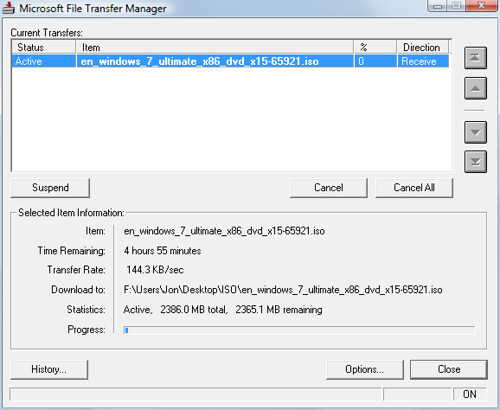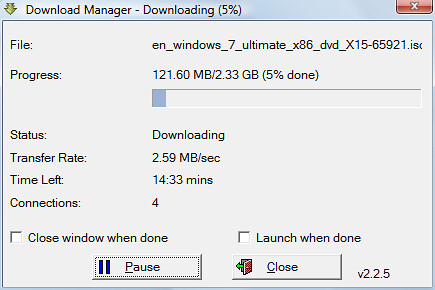Windows 7 RTM – Faster Download, Better Upgrade
Here are some quick tips now that Windows 7 is up on MSDN:
Faster download
Download via the MSDN Top Downloads link instead of the MSDN File Transfer Manager. The MSDN Top Downloads are delivered via Akamai, and my download speeds jumped from 200KB/s to 2MB/s when I switched to it. (thanks to Greg Duncan for the pointer)
UPDATE: There’s also an Akamai link for Technet Subscribers.
Upgrade from previous Windows 7 installs
Contrary to popular opinion, you can upgrade from Beta or RC to RTM. It’s not officially supported, but it’s not a hack, either. There’s a single INI file you need to edit, and it put there for just that purpose. The Windows 7 team wrote about this on the Engineering Windows 7 Blog, and Lifehacker explained the steps a little more clearly:

- Download the RC ISO and burn to a DVD.
- Copy that burnt image to an external drive or a spare partition. [note – I just copied to a folder on the desktop of the computer I’m upgrading]
- Find the sources directory, and open the file cversion.ini in your favorite text editor
- To quote directly from Microsoft: “Modify the MinClient build number to a value lower than the down-level build. For example, change 7100 to 7000.”
- Save the file, and then run setup as normal to start installation.
This sounds more complicated than it is – download DVD, copy files to the computer you’re upgrading, edit one line of a text file, and run the setup.exe. That’s it.
I’ve upgraded a machine from Beta to RC to RTM and it worked just fine.
Note that it's not officially supported, so if you have time to do a fresh install, I'd recommend it. The Beta->RC->RTM comes only with the Jon Galloway - Works On My Machine seal.
Pick the right version
I like the Windows 7 Edition comparison chart on Wikipedia – it’s does a good job of showing exactly what changes between versions.
Uninstall Visual Studio 2010 Beta1 (if installed) before upgrading
This would be a bit of an edge case, but since we’re talking about downloading from MSDN then it’s very possible that some folks have Visual Studio 2010 Beta 1 installed on a Vista machine and want to upgrade to Windows 7. See Scott Hanselman’s post: Vista Users - Uninstall Visual Studio 2010 Beta 1 before upgrading to Windows 7
This applies to Windows 7 RC as well, unfortunately. Scott's post points that out:
* You might be running Windows 7 RC and thinking to do an unsupported upgrade to Windows 7 RTM. If so, remember, it's not supported, but you'll have this problem upgrading too, so uninstall Dev10b1/.NET4 first.
About Upgrades
I’ve heard generally good things about the Vista –> Windows 7 upgrade. It didn’t work on my 2 year-old Vista install. Admittedly, that box is jam packed with random alpha software and I’d have been shocked if it worked. On the bright side, though, it cleanly rolled back and left me with my old Vista install.
I have upgraded two machines from Windows 7 Beta –> RC with absolutely no problems, and am getting set to upgrade them to RTM now.
Know what your license covers
The Beta test license covered pretty wide use, but the MSDN licenses are more strict. Technically, an MSDN licensed operating system can only be used for development, not “mixed-use” like games or e-mail:
Many MSDN subscribers use a computer for mixed use—both design, development, testing, and demonstration of your programs (the use allowed under the MSDN Subscription license) and some other use. Using the software in any other way, such as for doing email, playing games, or editing a document is another use and is not covered by the MSDN Subscription license. When this happens, the underlying operating system must also be licensed normally by purchasing a regular copy of Windows such as the one that came with a new OEM PC.
Note that the MSDN licenses does allow for “one copy of certain desktop applications on one device for any purpose”, those applications being mostly Office applications. But, as I read it, you’d need to install those Office apps on a non-MSDN licensed operating system.
I will be conducting random searches to verify that you are complying with this.

